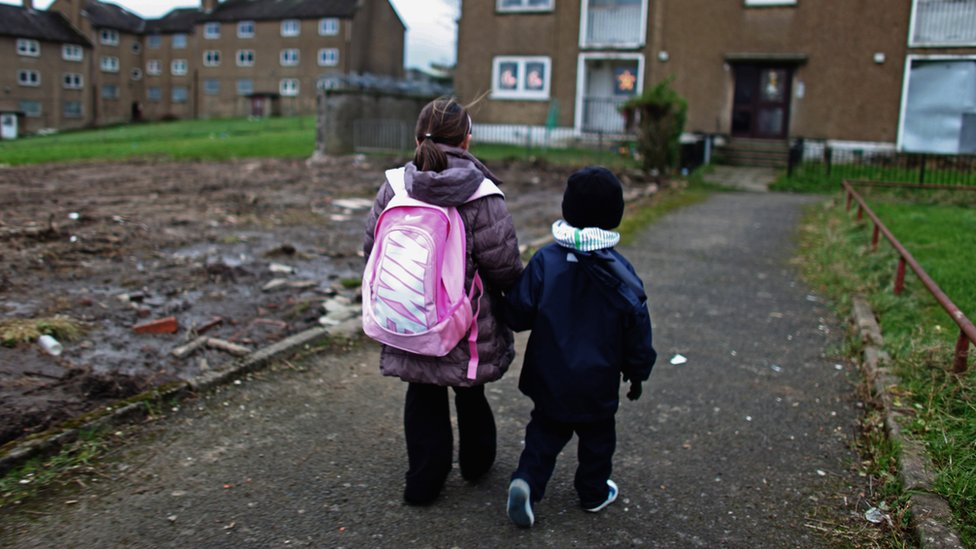The Institute of Health Visiting (iHV) has shed light on a troubling reality that underscores the socioeconomic disparities within the United Kingdom.
According to their annual survey of health visitors, poverty emerged as a more significant challenge for families in England compared to the rest of the UK. This revelation highlights the growing strain on families and the pressing need for targeted support systems.
The Scope of Poverty and Its Impacts on Families
Poverty’s pervasive influence on families in England has drawn significant attention. In the survey conducted by the iHV, an alarming 86% of health visitors in England identified poverty as a major factor affecting families, necessitating additional health visiting support.
This contrasts with Scotland, Wales, and Northern Ireland, where child behavior problems, such as those associated with Autistic Spectrum Disorders (ASD) and Attention Deficit Hyperactivity Disorder (ADHD), were the second most cited reason for increased support.
The correlation between poverty and child health outcomes is undeniable. Families grappling with financial hardship often struggle to meet basic needs, including adequate housing, nutrition, and healthcare. This, in turn, impacts children’s physical and mental well-being, their developmental milestones, and their future prospects.
iHV’s chief executive, Alison Morton, emphasized that poverty’s ramifications extend far beyond immediate struggles, potentially leading to issues such as homelessness, social isolation, and long-term mental health challenges.
Read : Global Poverty Watch : top 10 poorest countries in the world in 2024
Health visitors in England reported that their work increasingly revolves around addressing the repercussions of poverty. They noted that their time is heavily invested in supporting families facing financial difficulties and dealing with safeguarding concerns that fall below the threshold for formal social care intervention.
This diversion of resources has highlighted the need for a more comprehensive and multifaceted approach to tackling poverty’s impact on families.
England’s Unique Challenges Compared to the Rest of the UK
The survey results reveal distinct differences in the challenges faced by families across the four nations of the UK. While poverty ranks as the second most significant issue in England, families in Scotland, Wales, and Northern Ireland were more likely to seek support for managing behavioral problems in children.
This disparity underscores the unique socio-economic landscape in England and the factors exacerbating poverty-related challenges. The rising cost of living, particularly in urban areas of England, has played a pivotal role in deepening the financial strain on families.

With housing prices soaring and utility bills climbing, many families find themselves unable to make ends meet. These challenges are compounded by cuts to public services, leaving vulnerable families with fewer safety nets and less access to essential support systems.
In contrast, the devolved nations of Scotland, Wales, and Northern Ireland have adopted more community-focused and inclusive policies that address family welfare.
Initiatives aimed at early intervention and support for children with neurodevelopmental disorders have been more pronounced, helping to alleviate the burden on health visitors. However, even in these nations, the demand for health visiting support has surged, indicating widespread challenges that transcend borders.
The iHV survey also highlighted the role of safeguarding concerns in England, which often fall short of the criteria for formal social care involvement.
These cases, while not categorized as severe, still require significant attention and intervention from health visitors. This additional layer of responsibility further strains an already overburdened system and diverts resources from addressing other critical needs.
The Need for Comprehensive Support and Policy Change
The findings from the iHV survey underscore the urgent need for systemic changes to address poverty and its cascading effects on families. Tackling poverty requires a coordinated effort that includes policy reforms, increased funding for social services, and community-based initiatives.
One of the primary recommendations is to strengthen early intervention programs. By identifying families at risk and providing targeted support, health visitors can help mitigate the long-term impacts of poverty on children.
This includes ensuring access to nutritious food, safe housing, and quality healthcare, as well as supporting parents through education and employment opportunities.

Investing in mental health services is another critical component. The survey found that mothers’ mental health problems during and after pregnancy were the top reason across the UK for families needing additional support. Addressing these issues requires a robust mental health infrastructure that is accessible and responsive to the needs of vulnerable families.
Moreover, safeguarding concerns must be addressed more comprehensively. Ensuring that families receive the necessary support before issues escalate to the level of formal social care can prevent more severe outcomes and reduce the strain on health visitors.
This involves enhancing collaboration between health services, social care, and community organizations to create a more integrated support system.
Finally, addressing the root causes of poverty is essential. Policymakers must prioritize measures that reduce income inequality and provide families with the resources they need to thrive.
This includes increasing the minimum wage, expanding access to affordable childcare, and implementing housing policies that prioritize the needs of low-income families.

The iHV’s findings serve as a stark reminder of the challenges faced by families in England and the broader UK. Poverty, with its far-reaching consequences, continues to shape the lives of children and their families, leaving health visitors grappling with the enormous task of providing support amidst growing demand.
Addressing these challenges requires a united effort from policymakers, healthcare providers, and communities. By prioritizing early intervention, mental health support, and systemic changes to reduce poverty, we can work towards a future where all families have the opportunity to thrive.
The disparities highlighted in the survey also emphasize the need for tailored approaches that consider the unique circumstances of each nation within the UK.
By learning from successful initiatives in Scotland, Wales, and Northern Ireland, England can implement strategies that more effectively address the needs of vulnerable families and create a more equitable society.

